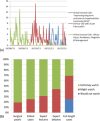Development of an international online learning platform for hepatopancreatobiliary surgical training: a needs assessment
- PMID: 24961380
- PMCID: PMC4253337
- DOI: 10.1111/hpb.12289
Development of an international online learning platform for hepatopancreatobiliary surgical training: a needs assessment
Abstract
Background: The Americas Hepato-Pancreato-Biliary Association (AHPBA) and the Australian and New Zealand Hepatic, Pancreatic and Biliary Association (ANZHPBA) are developing an online distance learning curriculum to facilitate an interactive didactic experience for hepatopancreatobiliary (HPB) fellows in the operationalization of existing HPB fellow curricula. Two needs assessment surveys were carried out to identify the optimal structure and process for deployment in fellow education.
Methods: A 22-question survey querying fellows' learning styles and current and anticipated use of learning tools was disseminated electronically to 38 North American and Australasian HPB fellows. A follow-up 20-question survey was administered to assess fellows' feelings regarding online content.
Results: Response rates were 55% (n = 21) for the first survey and 42% for the second (n = 16). In the first survey, 67% of respondents claimed familiarity with the required HPB curriculum, and 43% indicated dissatisfaction with current personal study strategies. A total of 62% (n = 13) reported studying with focused clinical relevance versus using a prescribed curriculum (n = 1, 5%). Fellows anticipated participating using online tools once (n = 10, 48%) or two or three times (n = 5, 24%) per week. Most respondents (n = 18, 86%) would meaningfully follow one or two discussions per month. The second survey identified themes for improvement such as discussion topics of interest, avoidance of holiday timing and mandatory participation.
Conclusions: An international online distance learning format is an appealing mechanism for improved dissemination and operationalization of the established HPB fellow curricula. Fellows will engage in interactive discussions monthly. Controversial topics or those requiring complex decision making are best suited to this learning format.
© 2014 International Hepato-Pancreato-Biliary Association.
Figures



References
-
- Americas Hepato-Pancreato-Biliary Association. 2008. AHPBA fellows' curriculum. Available at http://www.ahpba.org/assets/fellowship/AHPBA_HPB-Curriculum.pdf (last accessed 11 June 2014)
-
- Australian New Zealand Hepatic, Pancreatic and Biliary Association. 2009. ANZHPBA Fellows curriculum. Available at http://www.anzhpba.com/pdf/anzhpba-fellowship-hpb-surgery.pdf (last accessed 11 June 2014)
-
- International Hepato-Pancreato-Biliary Association. 2008. IHPBA training standards. Available at http://www.ahpba.org/assets/fellowship/IHPBA_hpb_training_standards.pdf (last accessed 11 June 2014)
-
- Muse HE. The Web-based community college student: an examination of factors that lead to success and risk. Internet High Educ. 2003;6:241–261.
-
- Sowan AK, Jenkins LS. Designing, delivering and evaluating a distance learning nursing course responsive to students' needs. Int J Med Inform. 2013;82:553–564. - PubMed
MeSH terms
LinkOut - more resources
Full Text Sources
Other Literature Sources

